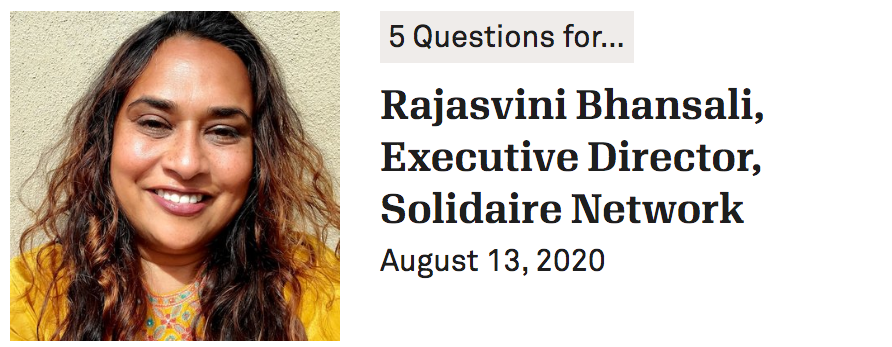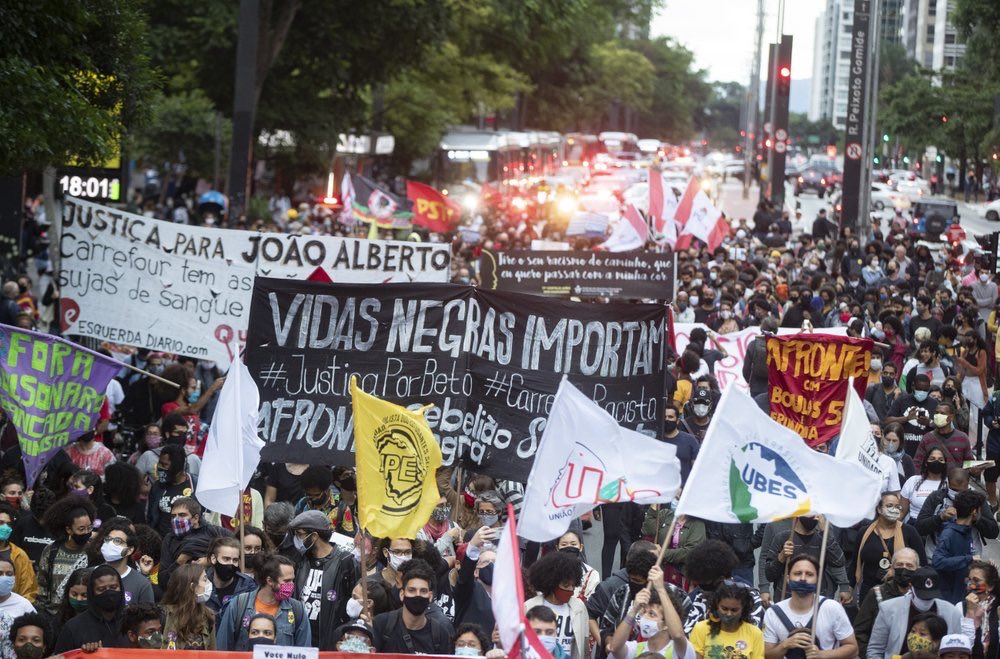Month: August 2020
‘Fund Us Like You Want Us to Win’
‘Fund Us Like You Want Us to Win’

Foundations are putting unprecedented billions into racial equity, but some grantmakers worry that too little is going to grassroots movements…
Community organizers are the ground troops in the fight for racial justice, yet they are often overlooked by institutional philanthropy, [some] critics say. The death of Rep. John Lewis was only the most recent reminder that powerful leaders often emerge from the rank-and-file of social movements.
“You need righteous agitators,” says Lateefah Simon, a lifelong advocate for racial justice who is president of the Akonadi Foundation [and Soliare board member]. “Systems don’t change themselves.”
“‘Fund Us Like You Want Us to Win’” by Marc Gunther, The Chronicle of Philanthropy / August 25, 2020
Read the full article here.
5 Questions for Rajasvini Bhansali, Executive Director, Solidaire Network
5 Questions for Rajasvini Bhansali, Executive Director, Solidaire Network

Philanthropy News Digest recently spoke with Vini about Solidaire’s activist-centered model, the meaning and implications of the reenergized movement for racial justice, and the organization’s latest fund.
We are heartened to see how deeply our members are committed to working together to eliminate racist attitudes, practices, and policies that harm working people and communities of color. We are also moved to see our donor members working internally and externally — and with humility and courage — with communities on the front lines of social change to provide the long-term, sustained support those communities need to liberate themselves — and all of us.
“5 Questions for Rajasvini Bhansali, Executive Director, Solidaire Network” by Kyoko Uchida, Philanthropy News Digest / August 13, 2020
Read the full interview here.
Liberating Wealth in Defense of Black Lives
Liberating Wealth in Defense of Black Lives
By Rajasvini Bhansali, Executive Director
Born out of a need to fight against corporate greed, economic inequality, and gender and racial injustice, Solidaire Network is a community of donor organizers who move quickly to get critical resources to the frontlines of social justice movements.
This community has been mobilized more than ever by the bold leadership and efforts of social movements around the country. As the fight against anti-Blackness and for Black liberation grows across the globe, we have intensified our efforts to ensure that movements have what they need to win now and for the long-haul.
Since our inception, the Solidaire Network has been committed to supporting Black liberation work by cultivating authentic, just and right relationships with Black-led organizations and community leaders. Our charge is to invest in movements so they can do the transformative work that benefits us all. Through the network, Solidaire members have moved nearly $8 million since 2013 in response to the call to philanthropy from the Movement for Black Lives to fund the movement, with trust in the wisdom and leadership of grassroots organizers.
Since June—and the start of this summer of uprising—Solidaire members have committed more than $10 million to the Black-led organizing ecosystem, including powerful efforts like Movement for Black Lives, the Southern Power Fund and Reparations Summer.
I am also thrilled to share that this week, the David and Lucile Packard Foundation has committed $20 million to Solidaire Network’s Black Liberation Pooled Fund over the next five years. The contribution is part of the Packard Foundation’s new $100 million commitment over the next five years to improve its grantmaking to support justice and equity.
Through the Black Liberation Pooled Fund, Solidaire is pooling resources to support the powerful ecosystem of Black-led social change organizations around the country including groups that are strengthening multiracial alliances; innovating grassroots climate justice solutions; working on decarceration and decriminalization of Black bodies; building regenerative economic models and community wealth strategies for shared prosperity; nurturing the leadership and capacity needs of movement organizations; imagining and creating our democratic, pluralistic, feminist futures and so much more. We are refining our grantmaking strategy to remain grounded in the immediate and long-term infrastructure building needs of the movement.
At the same time, we are evaluating the first five years of Solidaire’s Aligned Giving Strategy. Designed and driven by movement leaders, this strategy aims to provide long-term organizational support to Black-led movement building organizations, build capacity for shared movement infrastructure, and bolster economic independence and political power. Lessons learned from directing our members’ giving to these strategic interventions are now shaping our grantmaking through the Black Liberation Pooled Fund.
We know that much more remains to be done and, seven years in, our work is only just beginning. Across the country, movement leaders continue to organize for racial, economic and social justice in the face of an unprecedented pandemic, the global rise of white supremacy and authoritarianism, and the continued and destructive impact of systemic racism. These courageous leaders are not stopping anytime soon – and neither are we. Solidaire’s theory of liberation—our guiding strategy for the next decade—calls on us to serve as a critical resource mobilization arm for movements with the goal of moving $1 billion over the next 10 years so grassroots organizers have more of the resources they need to win.
At Solidaire, we believe people with wealth must act as “donor organizers” to dismantle unjust economic, political and cultural systems by directing significant resources toward movements for social and racial justice. We know our dreams and our shared fate are bound up with those most directly impacted by injustice. Solidaire members don’t give out of charity or paternalism. The only people we wish to “save” are ourselves by doing our part to make amends for the generations of oppression and theft upon which the current economic system has been built.
Supporting Black- and Indigenous-led social change advances racial and social justice for all people. The Black freedom struggle resulted in advancements for women, people with disabilities, LGBTQIA+ folks, immigrants and workers of all colors. Today, the work of visionary Black organizers and advocates has made broad systemic change—from defunding the police to police-free schools to reparations and reinvestment in community well-being—not only possible but also imminent.
Doing more in this moment requires that we not hoard wealth, but instead respond with care and abundance to the needs and demands of the movements that are working to dismantle systemic racism and create conditions for all of us to thrive.
In this moment and beyond, we remain committed to doing all we can to liberate wealth in defense of Black lives—now and for a generation.


